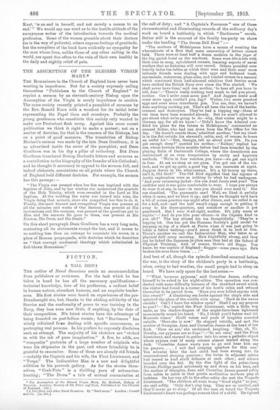THE ASSUMPTION OF THE BLESSED VIRGIN MARY.*
THE Romanizers in the Church of England have never been wanting in impudence. But for a society expressly calling themselves "Publishers to the Church of England " to reprint a sermon by an eleventh-century Bishop upon the Assumption of the Virgin is surely impudence in excelsis. The same society recently printed a pamphlet of sermons by the Rev. Ronald Knox with a woodcut for its initial letter representing the Papal tiara and 'monkey& Probably the
young gentlemen who constitute this society only wanted to make our Protestant flesh creep. Against this more recent publication we think it right to make a protest ; not on a matter of doctrine, for that is the concern of the Bishops, but on a point of good manners. The translation of Bishop Herbert's sermon was made by the late Dean Goulburn; it is so advertised inside the cover of the pamphlet; and Dean Goulburn was in his day a pillar of orthodoxy. But Dean Goulburn translated Bishop Herbert's letters and sermons as a contribution to the biography of the founder of his Cathedral; and he thought it necessary to append to the sermon full, and indeed elaborate, annotations on all points where the Church of. England held different doctrine. For example, the sermon has this passage:—
" The Virgin was present when her Son was baptized with the baptism of Sohn, and by her wisdom she understood the symbols of the Holy Trinity, which were revealed in the Lord at His baptism. At the wedding the water was turned into wine, the Virgin doing that miracle, since she compelled her Son to do it. Finally, the most blessed and evangelical Virgin was present at all the miracles and works of Our Saviour, was present at His instructions and His sermons, was present at the questions put to Him and the answers lie gave to them, was present at His Passion, His Cross, and His Death."
On this short paragraph Dean Goulburn has a very long note, contesting all its statements except the last, and it seems to us nothing less than an outrage to associate his name, in a piece of Roman propaganda, with doctrine which he describes as " that corrupt mediaeval theology which culminated, in
full-blown Romanism."


































 Previous page
Previous page